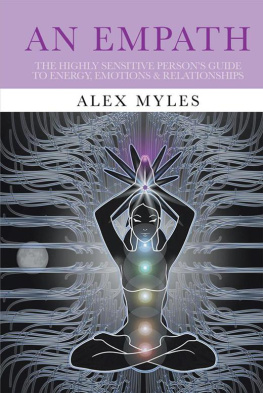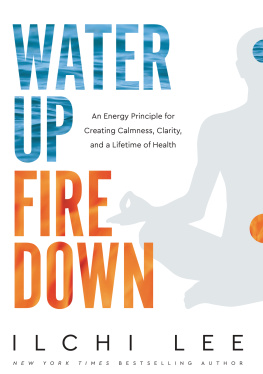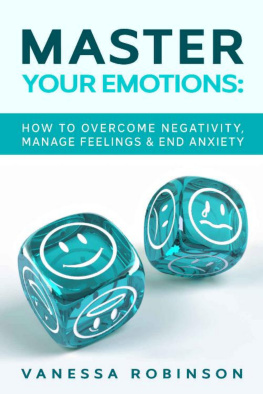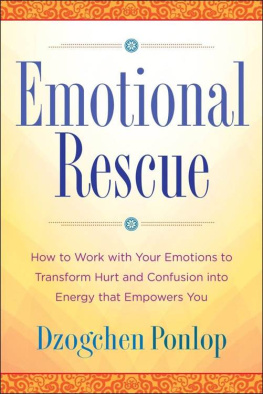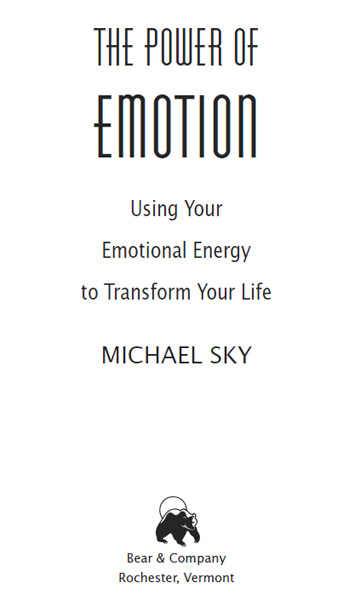
for Xiaowen
Acknowledgments
With Gratitude:
to Penny and Xiaowen for their love, inspiration, and all the quiet mornings;
to Gay Hendricks, Peggy Dylan, Mike White, Alice Miller, Gary Craig, Andrew Bard Schmookler, Leonard Orr, and Anna Coy for insightful nudges in new directions;
to Monica Woefel for gently shaping the early manuscript;
to Marilyn McGuire for the great support shes given me and so many other writers;
to Susan Davidson and Dana Walsh for helpful edits, and artist Alex Grey and designer Greg Crawford for a brilliant cover;
to Masumi Hori, Voice, and all my Japanese friends and students who invited me into their special world of emotion;
and, especially, to Adi Da Samraj, living master and teacher extraordinaire. Over the past twenty-five years, I have derived always clear guidance and happy crazy wisdom from his steady flow of amazing books.
Introduction
The bodily being of Man is constantly sustained by the Eternal, All-Pervading Force of Life. In our infantile recoil, reaction, and psycho-physical contraction toward self, we separate from the Eternal Reality and become self-possessed. Thus, we begin to starve and suffer.... If only the body-mind will open into the Current of Radiant Life, with full feeling and without thought, it will be liberated from the self-possessed games of tension and release of tension. Then there is only Fullness of Life.
ADI DA SAMRAJ, THE EATING GORILLA COMES IN PEACE
What a muddle we make of our emotions. From an early age we struggle to hold back tears, to rein in temper, to stifle fear. We worry about the future and regret the past. We ache from loneliness but recoil from intimacy. We want and we want, and so much of our wanting goes unfulfilled, leaving us frustrated, ashamed, envious. Our lives reveal a myriad of ways to feel bad; we feel bad much of the time.
Yet even feeling good brings difficulties. Pleasure leads easily into lust, as success leads into pride and appreciation, into greed. Love hurts as surely as it heals. Over-enthusiasm causes various problems, as do laughing too loudly and playing too hard. Faith begets betrayal, joy begets disappointment, and sex begets major complications. The good feelings never seem to last, and the more urgently we enjoy them, the more their passing wounds us.
Over time most people develop strategies for feeling less.Since emotion vexes and torments us so, we find ways to suppress our emotional experience. We learn to deaden our feelings, to turn off sensation, to numb out. Like rocks in the midst of rushing waterunmoved and unmovablewe cultivate stoicism. We strive to prevail, unaffected by lifes changes. Those who never show their feelings reap the highest praise.
We rationalize. Emotional expression belongs to the world of children, we say, while maturity means getting ones emotions under control. The overly emotional seem weak under fire; we favor those who remain firm and clearheaded during the worst of times. We especially spurn the messiness of emotional display, its bad form and awkward timing. Spiritual advancement, we assume, requires the taming of ones feelings. We distrust decisions and actions that have too much emotional influence. We try to do things rationally and logically, to act without feeling.
Ultimately each of us finds our own way with emotion. Some peoplethe granite faced and stone heartedmanage to completely suppress their feelings. Most only partially succeed: one never cries, for instance, but melancholy persists. Other people utterly fail despite all efforts, therapies, and medications; they spend their lives in a psychiatric soup of mutinous emotion. Still others ignore all of societys warnings and antiemotional dictates and remain unabashedly romantic, zealous, fiery, gushy, sentimental: they become artists, musicians, eccentrics, or clowns and migrate to the margins of social respectability.
Being socially acceptable demands that we get our feelings under firm control and keep emotional energy mostly unexpressed. That so many people do so well at suppressing their emotions constitutes a singular failing in human development and, I believe, a root cause of many problems of modern society.
Since the mid-1970s I have been meeting with individuals and groups as a therapist, counselor, teacher, and bodyworker. I have listened to thousands of life stories and have worked with a wide range of physical and psychological symptoms and complaints. I have learned that emotion plays an essential role in our lives, for better and for worse; that emotional energy subsists as a vital force within the human organism and as the functional link between body, mind, spirit, and environment; and that flowing with ones feelings opens the way to physical health, mental clarity, greater success in relationships, and more effective creativity.
I define emotion as energy-in-motion. Like ocean waves undulating along a shoreline, emotional energy exists as a constant flowing presence in our lives. Human feelingsthese subtle currents, part liquid, part electricarise as vital energy moving within, around, and between us, forever animating spirits, coloring thoughts, influencing dreams, heartening relationships, and providing the raw material for our bodies and creative efforts.
This book describes a radical path to Homo emotus: the feeling human. You will learn first to actively accept your emotions; second, to keep your emotional energies in perpetual motion; and finally, to direct all emotions to good, creative use. You will learn four basic tools that will profoundly transform your emotional experience. With time you can effectively marshal the creative force that dwells in every feeling.
At the end of each chapter I have included simple breathing practices that help you to experience and develop your energy-in-motion. I recommend that you do each practice at least once (the more the better), that you do themas you read, and that you do them in the order they appear in the book. In this way you will develop, step by step, an awareness of your breathing as an ever present and always flowing transformational process. By the end of The Power of Emotion, if you have practiced you will possess powerful tools for improving your physical and mental health, your relationships, and your creative efforts. Moreover, you will have formed a lasting appreciation for the beauty and power of human emotion.
Dancing with Fire
At our most elemental, we are not a chemical reaction, but an energetic charge. Human beings and all living things are a coalescence of energy in a field of energy connected to every other thing in the world. This pulsating energy field is the central engine of our being and our consciousness, the alpha and the omega of our existence.
LYNN MCTAGGART, THE FIELD
In the Kalahari Desert of central South Africa live an ancient people called the Kung. For the past several thousand years the Kung have lived a simple nomadic existence, following water about the desert and filling their days with the basic pleasures of gathering and sharing food, raising children, and joining in a variety of community rituals and celebrations.
Every month or so the Kung come together for their most important community ritual, the firedance. They build a large stack of wood and set it aflame, and then they begin to dance around the fire. Some of the people drum, others sing, and the strongest members of the community dance and dance, for hours and hours. They dance for so long and so vigorously that their dancing feet dig a groove in the earth surrounding the fire. As the dancing goes on, a shared feeling of excitement grows within the whole group, building and escalating, even as the fire, once furious, gradually quiets.
Next page

